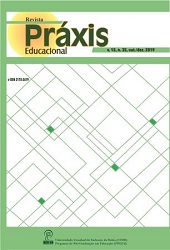THE HIGH SCHOOL, THE READER AND LITERATURE: THE VARIOUS SENSES OF RECEPTION THEORY
DOI:
https://doi.org/10.22481/praxisedu.v15i35.5671Keywords:
Reception Theory, Literature; Brazilian High School, BNCCAbstract
In the Brazilian High School, curricula direct the study of Literature to a temporal sequence of literary schools / periods, authors and historical contexts, which, depending on how they are presented, become less attractive and even distant from the reality of contemporary students immersed in the digital age. In view of this paradox, in which reading, albeit an important one, distances itself from the student / reader of this stage of Brazilian basic education, this article, under the reception theory bias (JAUSS et al., 2002; ZILBERMAN, 2012 ), addresses questions about the teaching of Literature (COSSON, 2009, 2014, TINOCO, 2010, 2014) in the Brazilian Public High School, based on the dialogical relation (BAKHTIN, 2003; 2017) among young readers of today, which are inserted in a society with easy access to information and communication mediated by technologies, and the literary text. For such an approach, the guidelines of the National Curricular Joint Base - BNCC of the Secondary School were observed, which will be based on the creation of the new school curricula in Brazil starting in 2019 and its manifestations that are in line with the idea that Literature teaching can be more attractive for contemporary readers.
Downloads
Downloads
Published
Issue
Section
License
Você é livre para:
Compartilhar - copia e redistribui o material em qualquer meio ou formato; Adapte - remixe, transforme e construa a partir do material para qualquer propósito, mesmo comercialmente. Esta licença é aceitável para Obras Culturais Livres. O licenciante não pode revogar essas liberdades, desde que você siga os termos da licença.
Sob os seguintes termos:
Atribuição - você deve dar o crédito apropriado, fornecer um link para a licença e indicar se alguma alteração foi feita. Você pode fazer isso de qualquer maneira razoável, mas não de uma forma que sugira que você ou seu uso seja aprovado pelo licenciante.
Não há restrições adicionais - Você não pode aplicar termos legais ou medidas tecnológicas que restrinjam legalmente outros para fazer qualquer uso permitido pela licença.












